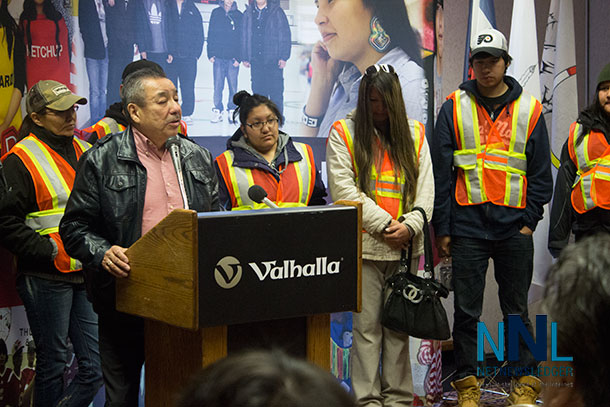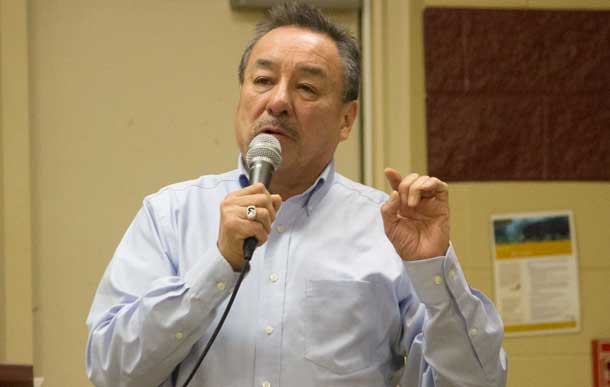
TORONTO – Ontario Regional Chief Stan Beardy is calling on CN Rail to immediately drop injunction laid against Judy DaSilva, a Grassy Narrows First Nation member and a Michael Sattler Peace Prize recipient, and members of the Grassy Narrows Women’s Drum Group for exercising their inherent and Treaty rights. Those issued the injunction appear in a Kenora court tomorrow.
On April 10, the women hosted a traditional Anishinaabe Water Ceremony on the shores of Wild Lake, near the CN Mainline at Mile 106 where it crosses Highway 671 between Kenora and Grassy Narrows, a location where the rail line passes directly by several lakes and river tributaries running along the southern boundary of Asubpeeschoseewagong (Grassy Narrows) traditional territory and multiple Anishinaabe families’ traplines.
The purpose of the ceremony was to protect the local waterways from increasing threats posed by the constant transportation of tar sands bitumen, natural gas and other explosive and toxic chemicals through First Nations’ territories.
Originally, the Water Ceremony was planned to take place on the tracks. However, on April 8, community members received calls from CN Rail Police and CN Aboriginal and Tribal Relations Management officials promising a heavy-handed response and threatening arrests. In response to these threats and intimidation, a Grassy Narrows Elder asked that the ceremony be moved to a location beside, not on the tracks.
“CN Rail is wrong if they think this is an issue of the courts—instead, it is a matter of First Nations’ ability to exercise their Inherent and Treaty Rights as indicated in the First Nations in Ontario Assertion of Sovereignty – Notice of Assertion and other Indigenous laws First Nations have in place,” said Ontario Regional Chief Stan Beardy. “First Nations in Ontario will lose trust and confidence in CN Rail very fast if our pre-existing sovereignty and Indigenous laws are ignored and courts are used as the venue for building our relationship.”
On March 10, Ontario Regional Chief Beardy issued a similar News Release highlighting Canada’s ways of getting oil to market being in direct conflict with Indigenous rights and public safety after three CN rail derailments took place on First Nations’ traditional territories. “What must be understood is that First Nations will not and cannot stop their efforts to uphold their responsibility to protect their ancestral homelands—it is our genetic make-up, core values and principles,” he stated.
Construction of railways and rail lines began in Canada in the 19th century. The building of the Intercolonial Railway was a condition written into the Canada Constitution Act, 1867. At the time, Indigenous people did not give their free, prior and informed consent but they relied on the Treaties which outlined an understanding of the relationship of equality and non-interference, amongst other agreements.
“Canada and CN Rail cannot any longer get around the fact that rail lines are on Treaty lands,” stated Ontario Regional Chief Beardy. Currently, no provisions are in place to notify or consult First Nation communities about the transportation of hazardous material like crude oil, spent fuel, and other radioactive material shipped through their traditional territories.
This is in direct contravention of the government’s duty to consult and accommodate First Nations. “Viewing rail lines simply being situated on Crown land, and/or rights of way is simply no longer feasible for First Nations,” stated Ontario Regional Chief Beardy.
The 133 First Nations in Ontario will be gathering in Assembly from June 16 – 18 in the Wauzhushk Onigum First Nation in Treaty #3 at which time major infrastructure on Indigenous lands such as pipelines and railways will be deliberated.
In the meantime, Ontario Regional Chief Beardy is calling on CN Rail to not only drop the injunction against Judy DaSilva and other individuals at the Grassy Narrows Women’s Drum Group Water Ceremony, but strongly urge CN and Canada, seriously consider a new approach to dealing with First Nations as their business and corporate responsibility agenda moving forward.






